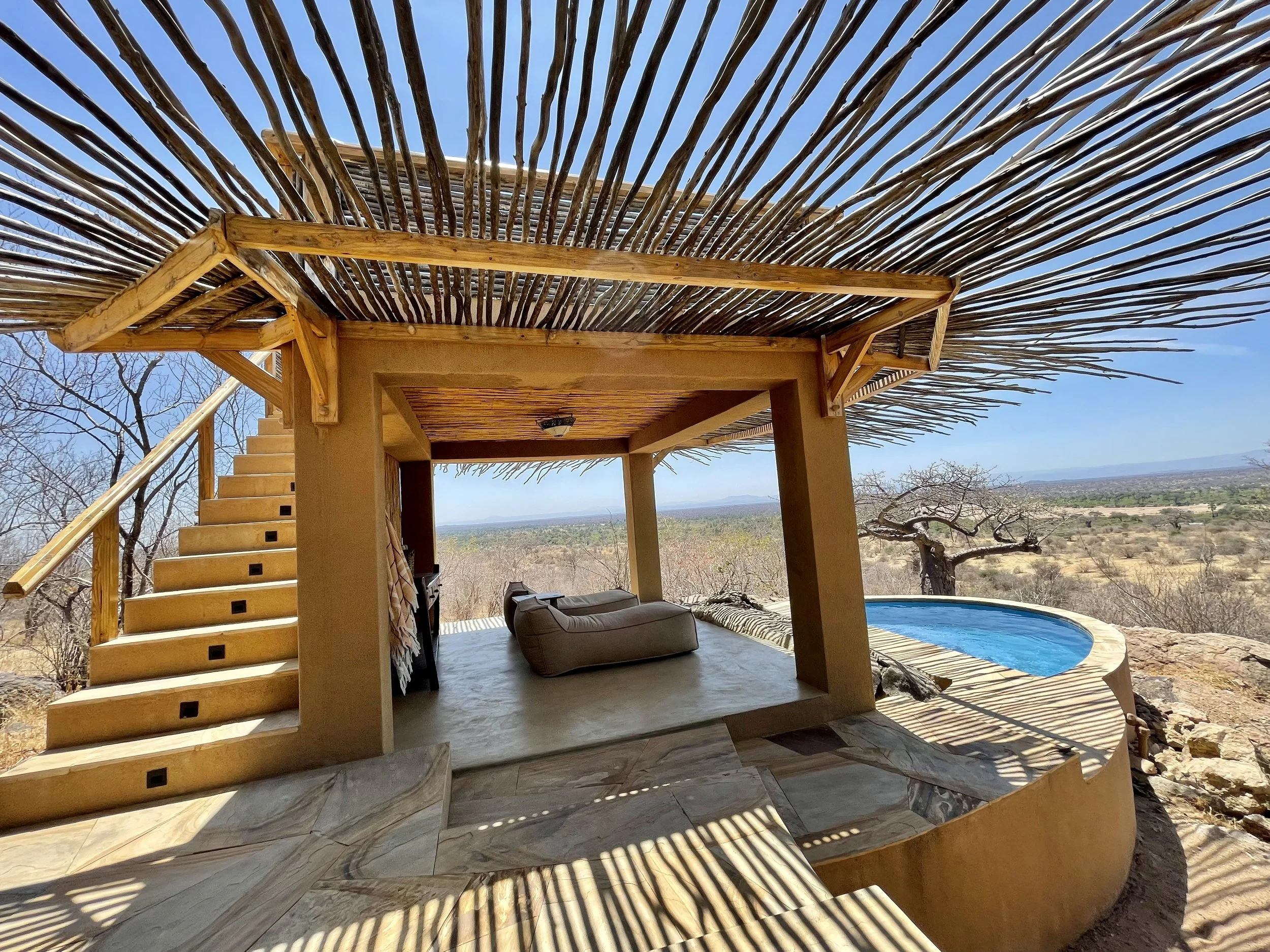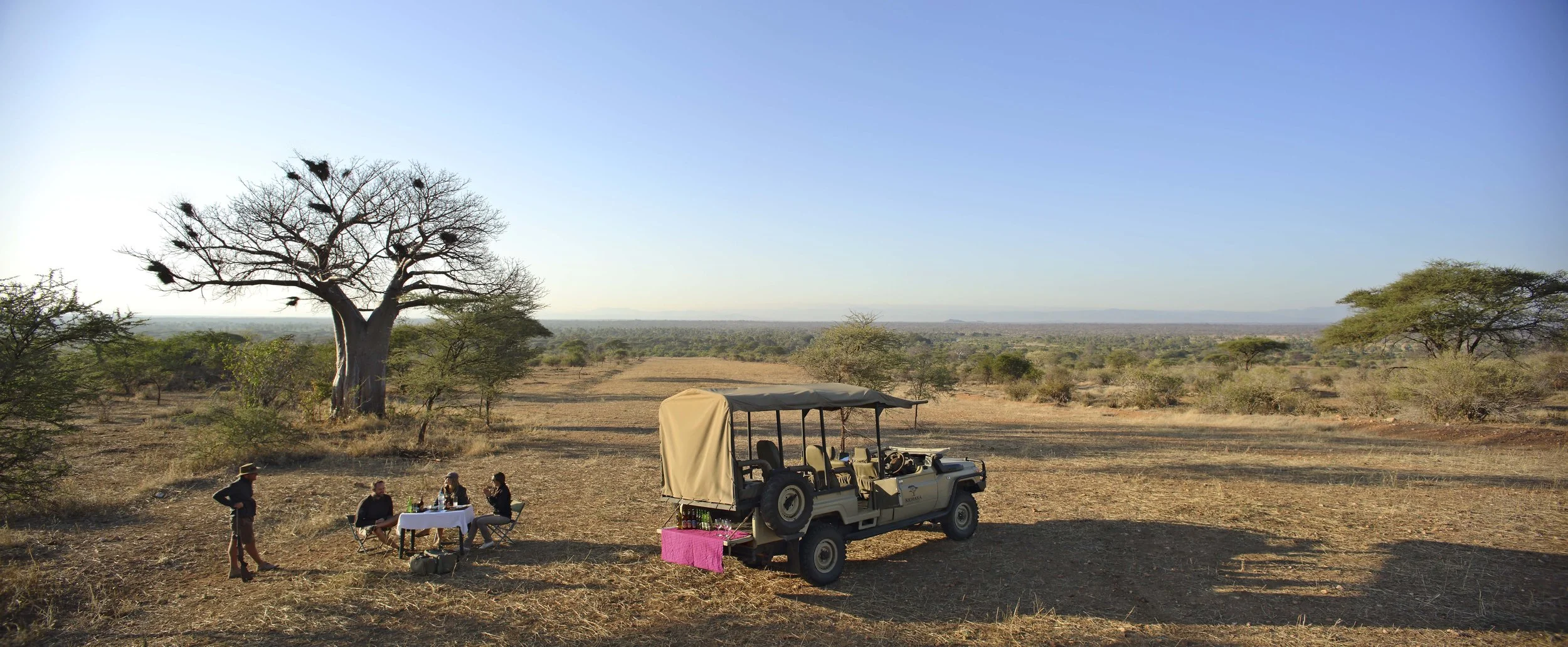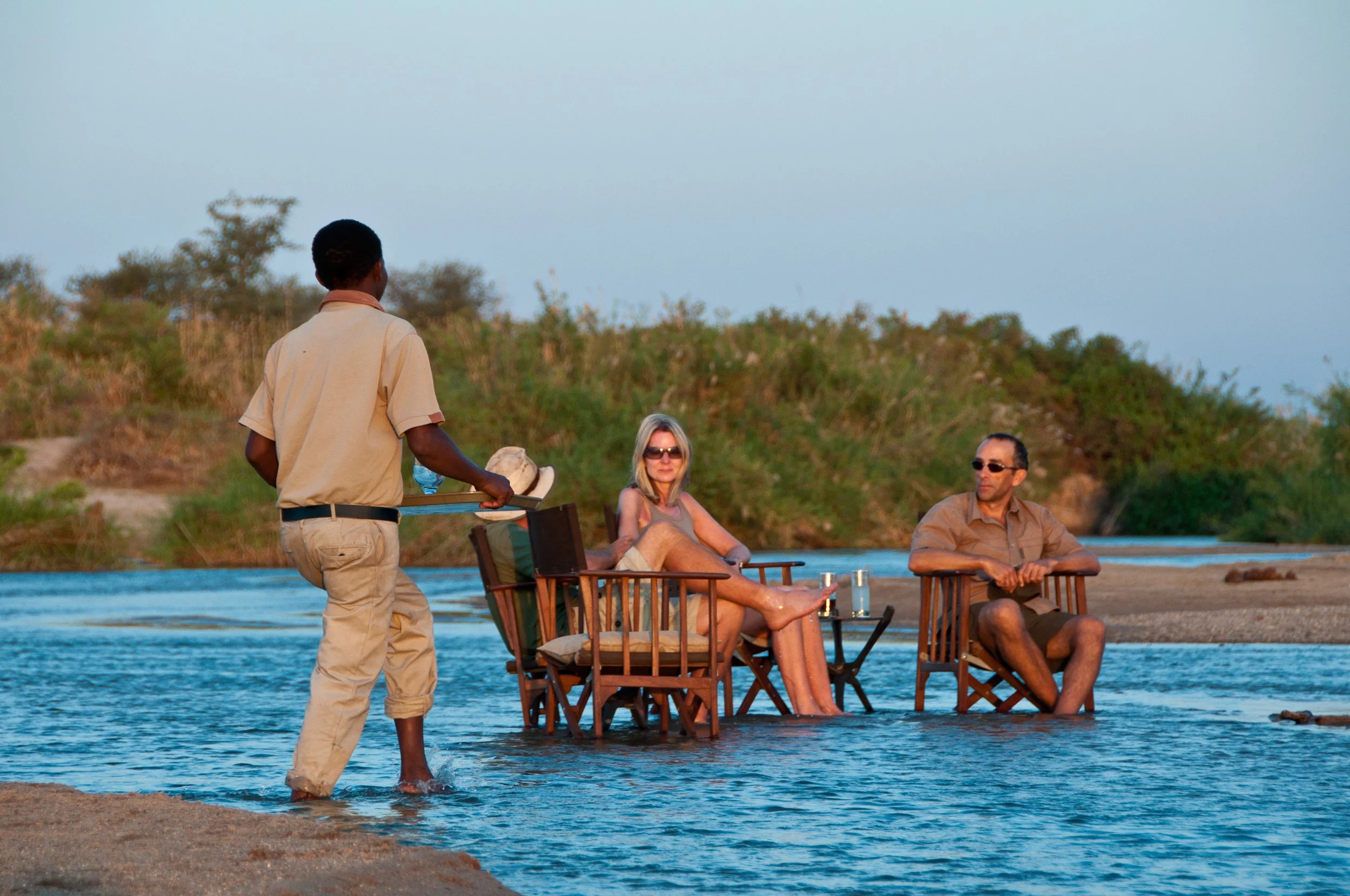Spotlight on Kichaka Expeditions, Ruaha National Park
Welcome to our latest blog post, where we dive into the heart of Tanzania's untouched wilderness to explore Kichaka Camp, nestled within the expansive Ruaha National Park. As Tanzania's largest national park, Ruaha is a haven for wildlife enthusiasts and those seeking an authentic safari experience away from the crowds. Kichaka Camp offers an intimate gateway to this vast landscape, known for its rugged beauty and diverse ecosystems.
This post uncover why Kichaka Camp is a premier destination for those looking to immerse themselves in nature, mainly through its renowned walking safaris. We'll walk you through the camp's accommodations and amenities that blend comfort with the essence of the wild, discuss the best times to visit for an optimal safari experience, and provide practical tips for preparing for your stay. Additionally, we'll answer some of the most frequently asked questions using the latest insights to ensure you're well-informed and ready to embark on your adventure to Kichaka Camp.
Whether you're a seasoned safari-goer or planning your first adventure into the African bush, join us as we explore what makes Kichaka Camp in Ruaha National Park a must-visit for anyone looking to connect with the raw beauty of Tanzania's wilderness.
Quick Facts About Kichaka Camp, Ruaha National Park
Location: Nestled in the heart of Tanzania's Ruaha National Park, the country's largest national park known for its diverse landscapes and abundant wildlife.
Experience: Kichaka Camp offers an unparalleled wilderness experience focusing on walking safaris led by experienced guides, providing guests with a unique opportunity to explore the African bush on foot.
Accommodations: The camp features limited tents, ensuring an intimate and exclusive experience. Each tent is designed to blend seamlessly with the natural environment, offering comfort while maintaining a close connection to nature.
Wildlife: Ruaha National Park is home to one of the highest concentrations of elephants in Africa, along with lions, leopards, cheetahs, and over 570 species of birds, making it a wildlife enthusiast's paradise.
Conservation: Kichaka Camp is deeply committed to conservation and sustainable tourism practices, working closely with local communities and conservation organisations to protect the park's ecosystems and biodiversity.
Seasons: While Ruaha National Park offers year-round wildlife viewing, the dry season (June to October) is spectacular for game viewing as animals congregate around water sources.
Accessibility: The camp is accessed by a light aircraft transfer to the nearest airstrip, followed by a short drive, offering a remote and secluded safari experience away from the tourist crowds.
Activities: Besides walking safaris, Kichaka Camp offers game drives, bird watching, and cultural visits, providing a comprehensive safari experience that caters to diverse interests.
Cuisine: Guests at Kichaka Camp enjoy meals prepared with fresh, locally sourced ingredients, offering a taste of Tanzanian cuisine with a gourmet twist, all served in picturesque outdoor settings.
Sustainability: The camp operates with a minimal environmental footprint, using solar power and water conservation systems and promoting a leave-no-trace philosophy to ensure the preservation of the natural environment for future generations.
A Bit About Ruaha National Park
Ruaha National Park, nestled in the heart of Tanzania, is a remarkable sanctuary of African wilderness. It remains off the beaten path for most safari-goers, making it a unique retreat for those in the know. As Tanzania's largest national park, Ruaha covers over 20,000 square kilometres of pristine landscapes, ranging from savannah and hills to rivers and baobab-studded plains. This vast park is renowned for its high concentration of elephants, boasting one of the largest populations of these majestic creatures in East Africa. Additionally, Ruaha is a predator's paradise, home to significant numbers of lions, leopards, cheetahs, and the elusive African wild dog. The park's diverse ecosystems support a wide array of birdlife, with over 570 species recorded, making it a birdwatcher's haven. Ruaha's remote location contributes to its untouched beauty, offering visitors a chance to experience Africa's raw and unspoiled nature, where wildlife roams freely in an expansive, breathtaking wilderness.
What Animals can you See in Ruaha National Park
In Ruaha National Park, visitors have the opportunity to witness a remarkable array of wildlife, making it a prime destination for safari enthusiasts. The park is renowned for hosting one of the largest populations of elephants in East Africa, along with a robust population of lions, known for their impressive prides. Additionally, guests can spot leopards, cheetahs, and the elusive African wild dog, offering a glimpse into the diversity of Africa's predators. Ruaha is also home to a variety of antelope species, giraffes, zebras, and over 570 species of birds, making it a vibrant ecosystem where each safari drive or walk reveals new wonders of the natural world.
Best Time to Visit
The best time to visit Ruaha National Park largely depends on what you wish to experience, but generally, the dry season, spanning from June to October, is considered ideal for wildlife viewing. During these months, vegetation is sparse, and animals congregate around water sources, making them easier to spot. The weather is also cooler and more comfortable for safari activities.
Dry Season (June to October): This is the peak season for safaris in Ruaha. With less vegetation and animals gathering at waterholes, it's an excellent time for game viewing. The risk of malaria is lower, and there are fewer mosquitos. However, it’s also the busiest time in the park, relatively speaking, though Ruaha is known for its lack of crowds compared to more famous parks.
Wet Season (November to May): The park transforms into a lush, green landscape following the rains, which start in November and can last until May. This period is fantastic for bird watching, as many migrant species arrive. The wet season is also when many animals give birth, offering unique opportunities to witness the circle of life in action. However, some areas might be inaccessible due to heavy rains, especially from March to May.
For birdwatchers, the wet season, particularly from December to April, is the best time as the park is alive with resident and migratory birds in breeding plumage. For those interested in flora and dramatic landscapes, the wet season also offers lush scenery and beautiful wildflowers.
Why Stay at Kichaka Camp?
Kichaka Expeditions embodies the timeless essence of Africa, capturing the vast expanses and unparalleled beauty that define this continent. Ruaha stands out as a secluded haven, untouched by the mass tourism and extensive infrastructure in Tanzania's more well-known parks to the North. The park's profound seclusion captured the hearts of Moli and Noelle, the founders of Kichaka, in 2007, compelling them to make it their home.
Here’s why you should put Kichaka Camp on your safari bucket list:
Intimate Wilderness Experience: Kichaka Camp is designed for those seeking an intimate connection with nature. With only a few tents, it ensures a personalised and exclusive experience, allowing guests to immerse themselves fully in the tranquillity and majesty of Ruaha National Park.
Expert-Led Walking Safaris: The camp specialises in walking safaris, providing a unique opportunity to explore the African bush on foot. Led by experienced guides, these safaris offer an up-close and personal encounter with the park's wildlife and landscapes, offering insights and experiences beyond the typical game drive.
Deep Commitment to Conservation: Staying at Kichaka Camp means supporting a deeply committed lodge to conservation efforts and sustainable tourism practices. The camp works closely with local communities and conservation organisations to preserve the ecosystem and biodiversity of Ruaha National Park.
Exceptional Wildlife Viewing: Ruaha National Park is known for its diverse wildlife, including one of the largest elephant populations in Africa, lions, leopards, cheetahs, and the rare African wild dog. Kichaka Camp's location within the park maximises opportunities for exceptional wildlife viewing in a less crowded environment.
Authentic Safari Experience: Kichaka Camp offers an authentic bush experience with accommodations that blend luxury and rustic charm. Guests can enjoy the comforts of home while being surrounded by the wild beauty of Tanzania, making for a truly memorable safari experience.
Customised Adventure: The small size of Kichaka Camp allows for customised experiences tailored to the interests and preferences of each guest. Whether you're interested in photography, bird watching, or learning about the local flora and fauna, Kichaka can arrange activities that cater to your passions.
Remote and Secluded: The camp's remote location ensures a peaceful and secluded stay away from the tourist crowds. This solitude enhances the feeling of being at one with nature and allows undisturbed wildlife encounters.
Sustainable Luxury: Kichaka Camp doesn't compromise on comfort, offering luxurious tents equipped with all the amenities needed for a comfortable stay, all while maintaining eco-friendly practices to minimise its environmental footprint.
Who Should Stay Here?
Kichaka Camp is ideally suited for a diverse array of travellers who share a common passion for nature, adventure, and the pursuit of tranquillity within Africa's untouched wilderness. Nature enthusiasts and conservationists will resonate with the camp’s sustainable ethos, while adventure seekers will revel in the unique walking safaris that offer an intimate glimpse into the African bush. It's an ideal destination for photographers and birdwatchers drawn to Ruaha National Park's rich biodiversity and scenic landscapes. Those searching for solitude and exclusivity will appreciate the camp's remote location and limited guest capacity, ensuring a serene and personal experience. Adventurous families, small groups looking for a bespoke safari experience, honeymooners, and couples will find the camp's secluded setting and intimate ambience perfect for creating lasting memories. Seasoned safari-goers eager to venture beyond the well-trodden paths to explore Africa's heart will find Kichaka Camp an unmatched choice, offering a rare blend of adventure, wildlife, and untouched natural beauty.
Activities at Kichaka Camp
Walking Safaris
Kichaka Camp distinguishes itself with its signature walking safaris, an immersive way to experience the raw beauty of Ruaha National Park. Led by seasoned guides, these walks bring guests face-to-face with the intricacies of the African bush, from tracking wildlife to identifying plants and understanding the ecosystem's delicate balance. It's an unparalleled opportunity to engage all your senses in the wilderness.
Game Drives
For those looking to cover more ground and witness the park's diverse wildlife, Kichaka also offers traditional game drives. These excursions are tailored to maximise wildlife sightings, including the park's famous large elephant population, pride of lion, and perhaps even the elusive leopard. Morning, afternoon, or full-day drives provide flexible options for any itinerary.
Bird Watching
With over 570 bird species recorded in Ruaha, bird watchers will find Kichaka Camp a paradise. The camp's guided bird-watching walks are a chance to spot some of the park's avian inhabitants, from the majestic fish eagles to the colourful lilac-breasted rollers. Whether you're a seasoned birder or a curious novice, the variety and vibrancy of Ruaha's birdlife are sure to impress.
Cultural Experiences
Kichaka Camp also offers guests a chance to connect with local cultures. Visits to nearby villages can be arranged, where guests can learn about the local communities' traditions, way of life, and conservation efforts. It's a meaningful way to understand the human aspect of conservation and the symbiotic relationship between the people and the land.
Each of these activities at Kichaka Camp is designed to provide guests with a deeper understanding and appreciation of Tanzania's natural beauty and the critical conservation efforts underway in Ruaha National Park.
Accommodation at Kichaka Camp
Accommodation at Kichaka Camp in Ruaha National Park is thoughtfully designed to blend luxury with the essence of the wild, ensuring guests enjoy a comfortable yet authentic bush experience. The camp offers a limited number of tents, emphasizing exclusivity and privacy in the heart of the Tanzanian wilderness. Here's what guests can expect:
Tented Accommodations
Luxurious Tents: Kichaka Camp features spacious, well-appointed tents that are carefully positioned to offer stunning views of the surrounding landscape while ensuring privacy. Each tent is equipped with comfortable bedding, ensuring a restful night's sleep amidst the sounds of nature.
Eco-Friendly Design: Reflecting a commitment to sustainability, the tents are constructed with natural materials and designed to have a minimal environmental impact. Solar power provides electricity, reducing the camp's carbon footprint.
En-suite Facilities: Despite its remote location, each tent boasts modern en-suite bathroom facilities, including flush toilets and safari-style bucket showers, offering a blend of comfort and authenticity. Hot water is readily available, ensuring guests can refresh and unwind after a day of adventure.
Food & Drink
At Kichaka Camp, guests are treated to a culinary experience that marries gourmet cuisine with a local twist, showcasing fresh, locally sourced ingredients in every meal. The camp's dining philosophy emphasizes flexibility and connection, offering both communal dining experiences and the option for private meals on each guest's veranda. With an emphasis on blending international and Tanzanian flavors, the menu caters to a variety of tastes and dietary requirements. Dining al fresco under the African sky, whether it’s breakfast at dawn or dinner beneath the stars, adds an unforgettable dimension to the safari experience, making every meal at Kichaka Camp as memorable as the adventures that fill the day.
Conservation and Community Efforts
Kichaka Camp is deeply committed to conservation and community engagement, reflecting a holistic approach to sustainable tourism in Ruaha National Park. Here's a snapshot of their efforts:
Wildlife Conservation: Kichaka Camp participates in initiatives aimed at protecting the park's diverse ecosystems and wildlife populations. This includes supporting anti-poaching units, wildlife monitoring, and research projects to ensure the health and safety of the species that call Ruaha home.
Habitat Restoration: The camp is involved in habitat restoration projects to repair areas of the park affected by human activity or natural processes. By restoring these areas, Kichaka helps to maintain the biodiversity and ecological balance of Ruaha National Park.
Water Conservation: Understanding the critical role water plays in the survival of both wildlife and local communities, Kichaka implements water conservation practices. These efforts help to sustain the park's water sources, benefiting the entire ecosystem.
Community Support and Development: Kichaka Camp works closely with local communities surrounding Ruaha National Park, supporting education, healthcare, and sustainable development projects. By engaging local communities and providing support, Kichaka aims to foster a positive relationship between the park and its neighbors, ensuring mutual benefits and the long-term success of conservation efforts.
Cultural Preservation: The camp also plays a role in preserving and promoting the rich cultural heritage of the local tribes. This includes cultural exchange programs and supporting traditional practices that are sustainable and beneficial to the community.
Eco-Friendly Operations: In its day-to-day operations, Kichaka Camp emphasizes eco-friendly practices, from the use of solar power to reduce its carbon footprint to implementing waste management strategies that minimize impact on the environment.
Through these various initiatives, Kichaka Camp not only provides an exceptional safari experience but also contributes significantly to the conservation of Ruaha National Park and the empowerment of its surrounding communities.
FAQ’s
What types of safaris does Kichaka Camp offer?
Kichaka Camp specializes in walking safaris led by experienced guides, offering guests an intimate experience of Ruaha National Park. In addition to walking safaris, the camp also provides traditional game drives, bird watching excursions, and cultural visits to nearby communities.
Can Kichaka Camp accommodate dietary restrictions?
Yes, Kichaka Camp can cater to various dietary restrictions, including vegetarian, vegan, gluten-free, and allergy-specific requirements. Guests are encouraged to communicate their dietary needs in advance to ensure the camp can prepare accordingly.
Is Kichaka Camp suitable for families with children?
Kichaka Camp welcomes families with children, though due to the nature of the activities, especially the walking safaris, it's best suited for families with older children. The camp advises on age-appropriate activities to ensure the safety and enjoyment of all guests.
How do I get to Kichaka Camp?
Access to Kichaka Camp is typically via a light aircraft transfer to the nearest airstrip in Ruaha National Park, followed by a short drive to the camp. The camp can assist with arranging transfers as part of the safari package.
What is the best time of year to visit Kichaka Camp?
While Kichaka Camp offers unique experiences year-round, the dry season from June to October is considered the best time for wildlife viewing, as animals gather around water sources. However, the wet season offers lush landscapes and excellent birdwatching opportunities.
What conservation efforts does Kichaka Camp support?
Kichaka Camp is actively involved in various conservation efforts, including wildlife monitoring, anti-poaching initiatives, habitat restoration, and water conservation. The camp also supports community development projects and works closely with local communities to promote sustainable living and conservation awareness.
How many guests can Kichaka Camp accommodate?
Kichaka Camp is an intimate safari retreat designed to accommodate a limited number of guests at a time to ensure a personalised and exclusive experience.
Are there any health and safety precautions taken at Kichaka Camp?
Yes, Kichaka Camp adheres to strict health and safety protocols to ensure the well-being of guests and staff. This includes food safety measures, emergency medical response plans, and safety briefings for all activities. The camp is also equipped with communication devices for emergencies.
Can Kichaka Camp arrange special occasions?
Kichaka Camp can arrange special occasions like honeymoons, anniversaries, and birthdays, providing unique experiences such as private dinners, special safari outings, and personalised touches to celebrate the occasion.
What should I pack for a stay at Kichaka Camp?
Guests are advised to pack comfortable, neutral-coloured clothing for safari activities, sturdy walking shoes, a hat and sunglasses for sun protection, a high-quality camera or binoculars for wildlife viewing, and any personal medications. The camp also recommends bringing a reusable water bottle and a flashlight or headlamp.




